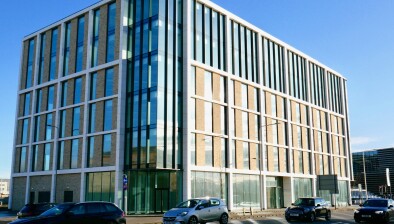Scottish Enterprise invests £8m in Dundee’s Life Sciences Innovation Hub

Adrian Gillespie – Scottish Enterprise chief executive
Scottish Enterprise is investing £8 million in the construction of the University of Dundee’s Life Sciences Innovation Hub, a new £40m facility set to open next year.
Adrian Gillespie, chief executive of Scottish Enterprise, and Deputy First Minister Kate Forbes are set to announce the £8m grant contribution during a visit to the site.
The facility will provide world-class laboratory and office space to spinouts from the University’s School of Life Sciences and spin-ins looking to partner with the University and benefit from the use of its facilities as they grow and scale.
This project is part of the Tay Cities Biomedical Cluster, backed by £25m from the Scottish Government, and is projected to create 800 jobs and generate £190m for the region by 2053.
Dr David McBeth, vice-principal (enterprise and economic transformation) at the University of Dundee, said: “By providing state-of-the-art facilities for early-stage, high-growth companies in the health and life sciences sector, we will ensure that inventions from the University of Dundee and other universities, colleges and research institutes in the Tay Cities region will remain anchored in Dundee as they grow.
“Retaining high growth companies in Scotland is central to Scotland’s national Innovation Strategy, and will help fulfil the aspiration to grow a vibrant cluster in Scotland, with the creation of many hundreds of high-value, high-skilled jobs in Tayside.”
Scottish Enterprise’s investment in the hub is part of its new missions-based approach. One of its aims is to double the number of scale-up businesses in Scotland over the next ten years by focusing on industries where Scottish businesses have global strengths, including life sciences.
The agency has more than doubled its high growth spin-out portfolio in recent years, helping to create 24 companies with potential to scale since 2020.
The University of Dundee has benefited from over £2m Scottish Enterprise spin-out funding as part of this activity, creating companies including biotechnology business Tay Therapeutics.
Mr Gillespie said: “Projects like this, which bring together globally ambitious innovators and entrepreneurs under one roof, are crucial to the success of Scotland’s economy. We’ll continue to work closely with the university to support spinouts and maximise their use of the hub’s excellent facilities to give their businesses the best possible start.
“Recently, the EY Attractiveness Survey again named Scotland as the most attractive location for inward investment outside of London. We will promote this exciting life sciences asset through our international networks to potential inward investors who are keen to collaborate with our entrepreneurs and young businesses.”
Glasgow-based R&D tax specialist Angela Banerjee, associate director at R&D tax credit consultancy ForrestBrown, said: “Facilities like the University of Dundee’s Life Sciences Innovation Hub are crucial to cultivate an ecosystem that supports innovative projects and drives them forward.
“Our hope is that the investment from Scottish Enterprise will not only provide state-of-the-art resources, but also foster collaboration between researchers, entrepreneurs and industry leaders. This synergy will help transform cutting-edge scientific discoveries into tangible, commercialised innovations.”
Ms Banerjee continued: “However, success in the life sciences industry can be further boosted by financial incentives, too. Grants like the Life Sciences Innovative Manufacturing Fund are critical in fast-tracking capital investment, and tax reliefs like Patent Box can support companies to commercialise their intellectual property by reducing their Corporation Tax bill.
“R&D tax relief also supports these businesses by incentivising investment in innovation. Between 2021-2022, the professional, scientific & technical industry was responsible for 16% of total R&D tax claims – the third highest of any industry in the UK, demonstrating the key role they play in supporting the sector.”













